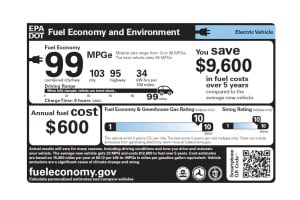Decoding Electric Car MPG
 Edmunds.com
Member, Administrator, Moderator Posts: 10,316
Edmunds.com
Member, Administrator, Moderator Posts: 10,316
 Decoding Electric Car MPG
Decoding Electric Car MPG
How does the fuel economy rating of an electric car differ from gas vehicles? Forget MPG. Meet the kilowatt-hour, and learn why smaller is better.
Tagged:
0

Comments
https://www.energycentral.com/c/ec/grid-efficiency-opportunity-reduce-emissions
An electric vehicle charged from a conventional power station is actually a coal-fired steam car. To realize the full environmental value of electric vehicles and their reduced "carbon footprint" the charging source must be renewable, or at least not based on fossil fuels.
This is why the kWh/100 miles formulation is bassackwards. It's literally upside down. Consumers are used to fuel economy being measured in distance per amount of fuel used, not the other way around. The economy of EVs should be measured in miles per kWh, not kWh per 100 miles.
And as others have noted, the EPA's inflated "MPGe" figures, which are based solely on the energy content of gasoline, fail to take into account the very large inherent inefficiency of thermal engines (in this case, internal combustion engines) -- that is, those engines' ability to convert the chemical energy in gasoline into actual work (i.e., miles of travel). As far as I can tell, the EPA is treating internal combustion engines as if they were 100% efficient, which is ridiculous. By my calculations, the equivalent fuel efficiency of the Ford Focus EV mentioned in the article, rated at 105 MPGe, is actually about 64.4 MPGe. (Based on its stated efficiency of 32 kWh per 100 miles.)
In all metric countries they measure fuel mileage as Litres/100 miles.
The kWh/100 miles just follows along with that.
No comment on the rest of it, or how it accurate it might be.
Edmunds Price Checker
Edmunds Lease Calculator
Did you get a good deal? Be sure to come back and share!
Edmunds Moderator